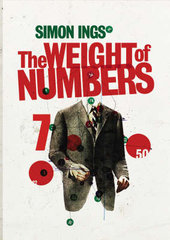
|
The Weight of Numbers
Paperback
Main Details
| Title |
The Weight of Numbers
|
| Authors and Contributors |
By (author) Simon Ings
|
| Physical Properties |
| Format:Paperback | | Pages:336 | | Dimensions(mm): Height 230,Width |
|
| Category/Genre | Modern and contemporary fiction (post c 1945) |
|---|
| ISBN/Barcode |
9781843544630
|
| Classifications | Dewey:823.914 |
|---|
| Audience | |
|---|
|
Publishing Details |
| Publisher |
Atlantic Books
|
| Imprint |
Atlantic Books
|
| Publication Date |
2 March 2006 |
| Publication Country |
United Kingdom
|
Description
From millions of lives, spanning continents and generations, come three people. One of them must bury fifty-eight illegal immigrants who have suffocated in a lorry, thousands of miles from home. The opposite of fate is the weight of numbers.
Author Biography
Simon Ings is a novelist and science writer. He lives in London with his wife and daughter.
ReviewsKirkus Review US:Three continents, 60 years and what feels like countless characters define this dense novel about politics, science and morals.If that seems like too much, you're right, it is. Ings, a British science journalist and science-fiction writer, bounces madly from the London blitz to the moon landing to our celebrity-soaked present day, but he never stays in one place long enough to make a reader feel caught up in the swim of history. And the characters just keep coming: There's Saul Cogan, an employee at a London philosophical society who gets drawn into a circle of revolutionaries in Mozambique; Stacey Chavez, a B-list actress whose stepfather is a business partner of Nick Jinks, who deals in human trafficking; Anthony Burden, a supposedly brilliant mathematician who's prone to emotional breakdowns and stuck in a failed marriage while living on an Israeli kibbutz; and, somewhat inexplicably, Jim Lovell, the commander of the ill-fated Apollo 13 mission, who runs a tony restaurant outside Chicago. Ings tries to connect the disparate timelines and characters, but unlike similarly ambitious novels like Don DeLillo's Underworld or David Mitchell's Cloud Atlas, this one never coheres into the illuminating vision of geopolitical chaos that the author intended to create. But though the book's pleasures are only intermittent, they do exist: Ings is a graceful writer, and he's on firm footing in the sections about Cogan's involvement in London's late-'60s revolutionary foment, and his descriptions of urban pranksters, squatters and activists of both the peace-and-love and violent varieties are informed and engaging. Indeed, it's obvious that Ings would have been much better served choosing a particular moment and spending time with it, instead of taking this ocean-wide, foot-deep approach.Reading the book is like flipping through 500 channels without stopping-lots of color and glimpses of interesting moments, but little coheres. (Kirkus Reviews)
|